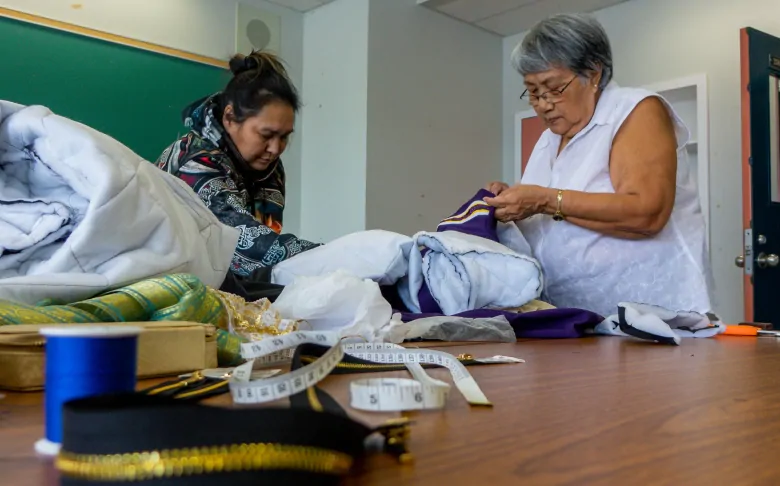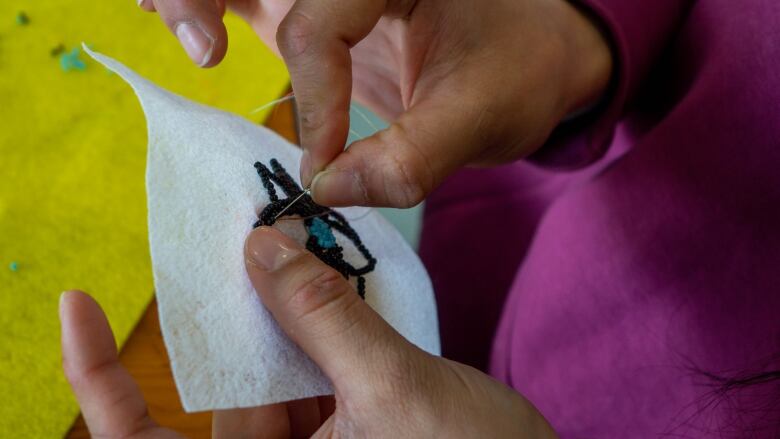Sewing, seal stew and stories: Inuit women in Ottawa gather to share traditions

On the second floor of an empty school in Ottawa’s Vanier neighbourhood, sewing machines hum, women chatter in Inuktitut and the scent of seal meat stew wafts from a slow cooker.
These classrooms at the former Rideau High School are now home to Odawa Native Friendship Centre and the Isaruit Inuit Women’s Sewing Centre.
Isaruit, which means wings, was conceived in 2016 to give Inuit women in Ottawa a place to gather, share stories and food, and learn to sew from elders in the community.
In 2019, with help from the Canada Council for the Arts, groups of Inuit students started meeting Tuesdays and Thursdays to learn how to make a single sewing project from beginning to end. This winter it was parkas.
Grace Salomonie, a 19-year-old Inuk who grew up in Iqaluit and Cape Dorset, is one of the regulars. The University of Ottawa biochemistry student comes by Isaruit to sit among other Inuit, eat lunch and practise her bead work.
“Coming here and hearing people speak my language, it’s so amazing because I don’t hear that often,” she said, carefully adding beads to a black and turquoise flower.
“I love the stories that they tell. That’s my favourite part.”
Tradition you can wear
Amanda Latreille, who is both Inuk and French Canadian, is nearly finished her parka.
It’s puffy and black, and scoops down in the back like an amauti, the traditional coats that have enough space in the hood for a baby. She plans to finish her hood with white fur and add ribbon to the cuffs — gold and white or gold and blue, she can’t decide.

Latreille, who works as a neonatal nurse at The Ottawa Hospital, has coveted an Inuit parka for years, but the price was a barrier. New Inuit-made coats can cost several hundred dollars.
“They’re absolutely gorgeous, but quite expensive,” she said. “This course allowed me to make my own and personalize it to how I want it.”
Even though she has to squeeze in time at Isaruit before a night shift, Latreille said she’s had “so much fun” making her coat with help from elders like Susie Etok Kettler and Elisapee Burmingham.
“[It’s] just how much knowledge they have, and bringing home a finished product that I can wear proudly,” she said.

Etok Kettler, who grew up in northern Quebec, said she learned to sew from her mother and grandmother.
“They teach me real good. If it’s not right, I always undo it until I get good at it. Over and over and over,” she laughed.
Much has changed since Etok Kettler moved down south to Ottawa to get married 50 years ago.
“Nowadays you can mix your colours. In the old days they only had white material and duffel,” she said. The white coats all had to be scrubbed clean by hand, Burmingham added.

Duffel, a thick, 100 per cent wool material similar to Hudson Bay blankets, hasn’t been available for years, the elders said. Seal skin, used in Nunavut for everything from coats to boots, is available but is too hot for Ottawa’s climate.
Instead, the elders teach students at Isaruit to make coats with Poly-Fil batting, covered with a wind-breaking synthetic material or canvas. It’s inexpensive material, but the coats end up better suited for Ottawa’s relatively mild winters.
‘It makes me feel stronger’
For Salomonie, the gift of Isaruit is how it brings together Inuit from across Ottawa, which is home to the largest Inuit community in southern Canada. She hopes more young people are drawn to the program so she can meet other Inuit her age.
“In the academic setting, there’s not a lot of people that speak Inuktitut,” Salomonie said. “Usually, when I go back home and I study I think about all the things I’ve learned. I’m learning how to bead, I’m learning different stories, learning different ways of thinking,” she said just before tucking into a small plate of seal meat and bannock.
“I carry it around with me, and it makes me feel stronger.”




